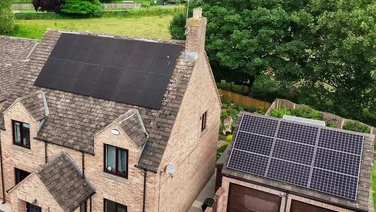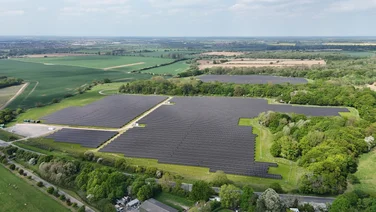We receive a small fee from trusted installers when you request a quote through our site. This helps us keep our content independent, well-researched and up to date – Learn more
- Since September 1st 2021, shops haven’t had new stock of halogen bulbs
- Replacing your bulbs with LEDs could cut energy costs by up to £200
- The ban is set to cut the UK’s annual emissions by 1.26 million tonnes
The halogen bulb ban came into effect across the UK on 1 September 2021.
The ban meant the bulbs weren’t sold in stores, meaning homeowners will need to update their lighting to alternative options, such as LED lights.
The move came ahead of another ban on the sale of flourescent lights, which came into effect in September 2023 and affected businesses all over the country.
Below, we’re going to cover how the halogen bulb ban affected homeowners, and what actions were taken as a result.
Why were halogen bulbs banned?
Halogen bulbs were banned to help save customers money, reduce energy usage, and cut the UK’s emissions.
In 2018, the UK government agreed to a European Union directive that has slowly eliminated the sale of inefficient light bulbs.
Non-directional halogen lamps were the first to go, and halogen bulbs were the next outdated model that was banned across the EU and UK.
This was a sensible policy for the UK to follow even after leaving the EU, because halogen lights are awful for your wallet and the world.
The bulb contains a filament enclosed in halogen gas, which allows it to burn hotter than older models (like the incandescent bulb, which was phased out from 2009 onwards), but that comes with disadvantages, especially compared to more modern bulbs.
Halogen lights are worse for the environment than LEDs because they use more energy to produce the same amount of light – meaning you’ll also pay more to use them.
Plus, halogen bulbs can start a fire if they come into contact with a flammable item, and cause burns if you touch them.
What was the impact of the ban?
The halogen ban aimed to help the UK to shrink its residential emissions.
Prior to their ban, the bulbs made up 16% of the UK’s annual footprint, partly because governments haven’t done enough to reduce them in the last few decades.
Homes emit 13.5% less than they did in 1990, according to government data – which sounds fine, until you realise the UK has cut its overall emissions by 49% since then.
Residential emissions have fallen at a slower pace than every sector apart from agriculture, and the government needs to pick up the pace if the UK is going to be a net-zero emissions country by 2050.

What are the alternatives to halogen bulbs?
LEDs currently make up two-thirds of bulbs sold across the country. They typically last five times longer than halogen bulbs, and give off the same amount of light while using 80% less energy.
This could significantly reduce your electricity bills, with the average household able to save £40 per year by replacing all their bulbs with LEDs, according to the Energy Saving Trust.
When buying new bulbs, watch out for the new energy efficiency labels, which now use a scale from A down to G. This move is intended to simplify a system that had confused consumers with the addition of A+, A++, and A+++ rankings.
And if it looks complicated to replace any of your bulbs, hire an electrician. It’s never worth the risk of messing up your wiring.
How much does it cost to replace your bulbs?
If you go for the environmentally and financially superior option of LEDs, it will cost about £145 to replace all your bulbs.
With an annual energy saving of £40, you’ll recoup that investment in well under four years – and LEDs usually last between 15 and 20 years.
That means that over their lifetime, you’ll make an average profit of £555 from buying LEDs.
What have been the long-term effects of the ban?
Currently, more than two-thirds of bulbs sold in Britain are LEDS, according to government data, making a considerable impact in improving the energy efficiency of UK buildings.
In fact, back in 2021, the government estimated the ban would save 10.6 TWh of energy per year by 2050, which will slash the country’s annual emissions by 1.26 million tonnes of CO2.
Getting rid of halogen bulbs was therefore a no-brainer, with no drawbacks aside from slight short-term inconvenience – though we shouldn’t overstate its environmental effects.
Eliminating more than a million tonnes of CO2 is fantastic, but it’s a small step.
Even if the government’s estimate is correct, the ban will reduce the country’s annual emissions by just 0.3% – and only in 2050.
The same is true of the government’s predicted reduction in energy usage. 10.6 TWh is substantial, but it’s just 0.5% of the 2,205 TWh the UK consumes per year.
Summary
- The ban meant the bulbs weren’t sold in stores, meaning homeowners will need to update their lighting to alternative options, such as LED lights
- Halogen bulbs were banned to help save customers money, reduce energy usage, and cut the UK’s emissions
- In 2018, the UK government agreed to a European Union directive that has slowly eliminated the sale of inefficient light bulbs
- LEDs currently make up two-thirds of bulbs sold across the country. They typically last five times longer than halogen bulbs
- With an annual energy saving of £40, you’ll recoup that investment in well under four years – and LEDs usually last between 15 and 20 years








